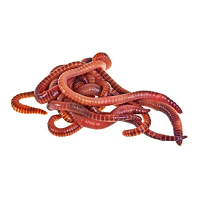Active red worms: Transform waste
Active red worms: Transform waste
Blog Article
Why Red Wigglers Are Crucial for Chemical-free Farming
Red wigglers play a crucial duty in natural farming, primarily through their one-of-a-kind capability to break down natural products and improve dirt health. The level of their influence on agricultural techniques and soil biology increases intriguing questions about the future of natural farming.
Duty of Red Wigglers in Dirt Health

Furthermore, red wigglers enhance dirt framework by producing networks as they burrow. These networks boost aeration and water infiltration, advertising a much healthier root atmosphere. Their task also assists in keeping optimal dampness degrees, which is essential for healthy plant growth.

Benefits of Worm Spreadings
Worm castings, the nutrient-rich waste matter produced by red wigglers, function as a powerful change for organic farming. These spreadings are abundant with important nutrients such as nitrogen, phosphorus, and potassium, which are important for plant growth. Unlike artificial fertilizers, worm castings launch nutrients slowly, giving a stable supply with time and decreasing the danger of nutrient leaching and drainage.
Additionally, worm spreadings boost dirt structure and oygenation, promoting healthier root systems. Their high raw material content enhances wetness retention, making it possible for plants to better hold up against drought conditions. Furthermore, worm castings consist of helpful microbes that support plant health by reducing pathogens and improving nutrition uptake.
The application of worm spreadings can lead to increased crop yields and improved top quality of fruit and vegetables, making them an indispensable resource for natural farmers. Their usage additionally straightens with sustainable farming practices, contributing to soil fertility without the unfavorable ecological impacts continue reading this related to chemical fertilizers. On the whole, the incorporation of worm castings into farming methods cultivates an extra resistant and productive community, highlighting the relevance of red wigglers in chemical-free farming systems.

Enhancing Nutrient Cycling
(red worms for sale)Nutrition cycling is an important procedure in chemical-free farming, and the combination of red wigglers plays a critical duty in enhancing this cycle. These earthworms add substantially to the break down of raw material, assisting in the transformation of intricate natural materials into less complex, a lot more available nutrients for plants. As red wigglers take in rotting organic matter, they secrete nutrient-rich castings, which are including helpful microorganisms. This microbial task further help in the decomposition procedure, making sure that essential nutrients are easily available for plant uptake.
Additionally, red wigglers help to increase the mineralization of nutrients, transforming them from inert types right into bioavailable forms that plants can absorb. This process is important for maintaining soil fertility and advertising healthy plant development. The presence of red wigglers likewise urges a varied dirt community, cultivating a balance of nutrients that sustains various plant species.
Improving Soil Structure
The enhancement of soil framework is vital for promoting a healthy and balanced farming environment, and the task of red wigglers dramatically adds to this renovation. These earthworms play an important role in aerating the soil and creating a network of networks that facilitate water infiltration and root penetration. As they delve via the dirt, red wigglers damage up compressed layers, permitting much better oxygen exchange and promoting microbial activity.
In addition, the raw material created from their waste, called vermicast, improves soil aggregation. This process creates steady clumps of dirt fragments, enhancing dirt porosity and minimizing erosion (red wigglers). The presence of red wigglers also motivates the advancement of helpful fungal networks, which are crucial for nutrient uptake by plants
Supporting Sustainable Practices
Integrating red wigglers into natural farming practices not just enhances dirt health and wellness but likewise advertises lasting farming methods. These earthworms play a vital function in nutrition cycling, transforming organic waste into important garden compost that improves the dirt. By utilizing red wigglers, farmers can successfully minimize dependence on artificial plant foods, therefore decreasing chemical runoff and its destructive effects on ecosystems.
Furthermore, the incorporation of red wigglers urges the practice of recycling natural materials, such as kitchen area scraps and ranch waste. This waste decrease method not only decreases disposal costs yet likewise fosters a closed-loop system where nutrients are continually returned to the soil (red wigglers). Such techniques are important in minimizing climate adjustment, as they improve carbon sequestration and lower greenhouse gas emissions
Furthermore, red wigglers improve water retention in the dirt, which is essential in times of dry spell. Their burrowing activities develop networks that enable water to pass through deeper into the ground, hence promoting effective water use. Ultimately, incorporating red wigglers right into chemical-free farming not just sustains biodiversity but additionally aligns with the concepts of lasting farming, using an alternative strategy to food production.
Verdict
In final thought, red wigglers play a critical role in organic farming by substantially boosting dirt health and wellness and fertility. Thus, the assimilation of red wigglers into farming practices is important for promoting sustainability and enhancing overall dirt top quality.
Report this page